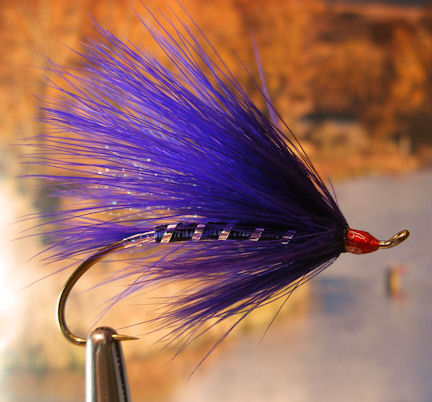
On The Fly
February 2011
"Fly tying is a school from which we never graduate"
TYING NEWS
The Southern Oregon Fly Tyers invite you to attend their meetings the second Tuesday
of each month. The next meeting is February 8, 2011. The meetings start at 6:00 PM, at the Madrone Hill
Mobile Home Park community building near Gold Hill. Bring a friend, come early so you don't miss anything,
and stay late. Tyers need not be experienced, and those with all levels of skill are welcome. Each meeting
a member is encouraged to demonstrate a new or different skill, from simple to difficult. For more
information, call Dan Kellogg at 773-4724.
SPECIAL TWO FOR ONE NIGHT
Fourscore and five years ago, his parents brought forth on this continent a newborn babe, conceived in a
spawning bed, and dedicated to the proposition that all men should be fly fishers. Please wish Dick
Bonamarte a very happy 85th birthday.
Perennial favorite, Dick Bonamarte, will be demonstrating two files at the February meeting. Both of these
imitations represent insect forms that are very common, so they are good choices for your fly box.
SWIMMING HYDOPSYCHE LARVA and the GREEN ROCK WORM
DIRECTIONS: Take Gold Hill Exit #40, off of I-5 and go west, toward Jacksonville, 1.3
miles, until you reach the brick entrance way to the Madrone Hill Mobile Home Park on the right. You’ll
pass a golf course parking lot on Your left shortly after leaving the freeway. After you turn right into the
mobile home park, proceed to the community building which is located about 100 yards ahead on the left. The
address is 8401 Old Stage Rd. Please park your vehicle on the bare dirt in the parking lot to avoid the
wooden septic covers in the grass.
PATTERN OF THE MONTH - Winter Purple

Hook: Daiichi 2441, traditional salmon/steelhead, size 4-8.
Thread: 6-0 red.
Tag: Flat silver tinsel.
Tail: Purple marabou fibers.
Body: Purple floss or flex floss.
Rib: Flat silver tinsel.
Underwing: 4 or 5 strands of pearl Krystal Flash.
Hackle: Purple saddle.
Wing 1-3: Purple marabou plume.
Collar: Purple saddle.
Tying Instructions
Step 1 Mash the barb and mount the hook in the vise.
Step 2: Start the thread one eye width behind the eye and lay down an even thread base to a position 1/8"
forward of the hook point.
Step 3: Cut a piece of flat silver tinsel about 6" long and tie it in above the hanging thread leaving 2"
tag extending toward the bend and 4" extending toward the eye. Wind the rear 2" tag toward the rear 1/8"
and back toward the eye the same amount. Tie off and trim.
Step 4: Select a small bunch of purple marabou plumes, measure to just past the end of the hook, and tie on
at the base of the tag. Tie down the butts along the top of the hook shank to behind the eye. Tie off and
trim.
Step 5: Tie in the floss at the original tie-in point behind the eye and lay it along the hook shank, tying
it down to the base of the tag. Return the thread to a point two eye widths behind the eye.
Step 6: Wind the floss forward in touching turns to the position of the hanging thread. Tie off and trim.
Step 7: Now wind the flat tinsel forward in 5 equal turns to the hanging thread. Tie off and trim.
Step 8: Select 4 or 5 strand of pearl Krystal Flash, measure length to the bend of the hook, tie on and
trim.
Step 9 Select a purple saddle hackle with barbs long enough to reach the point. Prepare the feather and tie
it on by the tip. Wind forward 3 turns, tie off and trim.
Step 10: Select a small bunch of purple marabou with fibers long enough to reach the end of the hook. Tie
on at the base of the hackle and trim butts. Select another small bunch of marabou with fibers shorter than
the first. Tie off and trim. Repeat with a third bunch shorter than the second, Tie off and trim.
Step 11: Select another purple hackle, prepare, tie on, and wind forward 3 turns. Tie off and trim
Step 12: Tie back on the hackle barbs until collar is at a 45 degree angle to the hook shank. Form an neat
tapered head, whip finish and cement.
This month's pattern, the Winter Purple, was originated by Trey Combs as part of a series for winter
Steelhead fishing. It was designed to sink well in deep pools, attract well in soft currents, but swim
upright, without turning over in heavy tail-outs. It is tied with a slim body, sparse materials and just
the right amount of flash.
TYING TIPS
The most difficult step in assembling this fly is the three-part wing. The secret is to
leave plenty of room behind the eye for the hackle, wings, and collar and to keep materials sparse. The
extra room allows each component to be tied in front of the last, decreasing the bulk. Keep thread wraps
to a minimum 2-3 wraps should be sufficient and trim close. Wrapping back on the collar covers the wing
tie-in thread wraps. Don't let the number of steps keep you from trying this pattern. It is not that
difficult and the materials are common. So tie some up, give them a test flight and let me know how you do.
Tie One On,
Dan Kellogg (you can contact me at FLYGUY@EZNORTHWEST.COM)